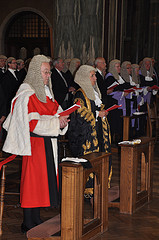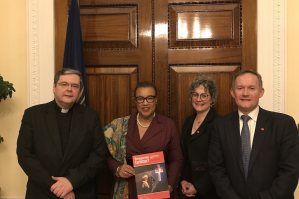Red Mass at Westminster Cathedral

Judges in full regalia
The annual Red Mass, marking the first day of the legal year, took place at Westminster Cathedral on Monday. 3 October. The congregation included Baroness Scotland, Lady Justice Rafferty, Court of Appeal judge, judges on the High Court bench, Mr Justice Tugendhat and Mr Justice Butterfield as well as many Catholic barristers, solicitors, policemen, probation officers and others connected with the courts. The Mass was celebrated by The Most Rev Vincent Nichols, Archbishop of Westminster.
In his Homily, Archbishop Nichols said: "Today we pray that our personal weaknesses - our preferences and prejudices, our personal experiences and pain - may not corrupt our judgement, whether in the court or in the Church. Ours is a judgement to be given in love - a love above all for the truth, and because it is for the truth, a love for the person who is subject to that judgement. Justice must surely be a service of love, not simply an exercise of power nor, certainly, of retribution."
Archbishop Nichols also said that every aspect of the legal process - enquiry, trial, judgment and review - needed the 'blest light' of the Holy Spirit: "We know only too well the complexity, even the deviousness, of the human heart. And you know well how difficult it often is to discern motive, effect, consequence as well as the responsibility and subsequent guilt. Even though procedures and precedent are well established, there remains in every case a moment of human judgement. 'Blest light' given at that moment is welcome indeed."
The Red Mass has always been an important celebration in the legal year. Before the Reformation the Judiciary and legal profession gathered at Westminster Abbey on the first day of the Michaelmas term, and law year, to call upon the Holy Spirit to guide it in its work in the year ahead.
This practice stopped during the Reformation but was revived in 1891, and from then until 1904 was celebrated in the Sardinian Chapel, now the Parish church of St Anselm and St Cecilia, Kingsway. In 1904 the Mass was transferred to Westminster Cathedral at the request of Archbishop Bourne (as he was then). Every year since then the tradition has continued at the Cathedral.
The arrangements for the Mass are made each year by the Thomas More Society, whose membership comprises mainly of Catholic members of the Judiciary and Bar as well as solicitors.
Full text of the Homily follows:
We began our Mass this morning with the lovely hymn to the Holy Spirit: Veni Creator Spiritus. It was a fitting prayer with which to start this Red Mass, a votive Mass of the Holy Spirit. The hymn, as you will know, is sung at many celebrations of Confirmation and at every ordination to Holy Orders. It is, we can say, our best prayer for the gift of the Holy Spirit. This morning we ask that gift for all involved in the administration of justice in our land.
All the words of this hymn are worthy of our reflection and contemplation. But I would like to focus on the fourth verse, on these words:
'O guide our minds with thy blest light
With love our hearts inflame
And with thy strength, which ne'er decays
Confirm our mortal frame.'
This, perhaps, is the essence of our prayer this morning. Minds involved in every aspect of enquiry, trial, judgment and review truly need 'thy blest light'. We know only too well the complexity, even the deviousness, of the human heart. And you know well how difficult it often is to discern motive, effect, consequence as well as the responsibility and subsequent guilt. Even though procedures and precedent are well established, there remains in every case a moment of human judgement. 'Blest light' given at that moment is welcome indeed.
The verse also acknowledges another important fact. It speaks of our 'mortal frame', 'infirma nostra corporis' and we - all of us - do well to remember our own limitations and weaknesses, no matter the stature of the office we may hold. Today we pray that our personal weaknesses - our preferences and prejudices, our personal experiences and pain - may not corrupt our judgement, whether in the court or in the Church. Ours is a judgement to be given in love - a love above all for the truth, and because it is for the truth, a love for the person who is subject to that judgement. Justice must surely be a service of love, not simply an exercise of power nor, certainly, of retribution.
The words of this morning's Gospel also speak of this gift for which we pray, the gift of the Holy Spirit. Now we learn a name by which the gift is known, a gift familiar to your profession: the Holy Spirit is an 'Advocate'. And we learn that the Advocate is the gift of the Father sent to us in the name of Christ.
So today, at this Mass we come to the true source of that gift: we come to Christ himself and the sacraments he has given to the Church, his body. Here is the source of the presence of the Holy Spirit in our lives. From Jesus himself comes this gift. We receive it from him, in the life of the Church. This is the joyful promise we are given.
Of course the flow of the Holy Spirit is not limited by the sacramental life of the Church. The Holy Spirit flows where He wills and we all know of the fruits of that Spirit found in so many people and places. But we are sure that the full and transforming gift comes to us through Christ's body, through the wound in his side, through the Church. Our Catholic faith, then, is indeed a precious gift, one to be treasured and nurtured not least for your lives and work.
A second point arises from this focus on the person of Jesus. He is the revelation of the justice of God. In him we see how God responds to us sinners, to us who offend against His love, His design for our happiness. In Jesus we see God's stance towards us as we stand in the dock, sure, in our hearts, of our guilt.
This revelation of God's justice is most fully expressed in the figure of our crucified Saviour. In his broken body we see the effects of our offences, for we know well that a crime and a sin always has its victim. In his unwavering love we see the mercy of God who permits all our failures, the damage we do and our anger at it, to be absorbed by Jesus - into the infinite capacity of his divinity - so that the justice of God may issue forth in forgiveness and freedom.
Our human justice can never match that! We struggle in the foothills of such grandeur of justice, mercy and love. Yet we must do our best in an oh-so imperfect world. We know that our system of justice are somewhat blunt - even brutal at times. But we also know it is the best we have. So we commend it, humbly, to the Lord who alone knows all hearts and who is abounding in love and mercy.
'O guide our minds with thy blest light
With love our hearts inflame
And with thy strength which ne'er decays
Confirm our mortal frame.'
Amen.
Source: Archbishops' House


















